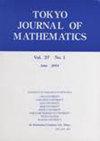一元多聚对数及其$q$-类似物的对偶性
IF 0.4
4区 数学
Q4 MATHEMATICS
引用次数: 2
摘要
Hirose、Iwaki、Sato和Tasaka用迭代积分的方法证明了一元多聚对数的对偶关系。本文利用Seki和作者最近发明的连通和方法给出了一个新的证明。有趣的是,连通和在其连接符中包含超几何函数。此外,我们还引入了一元多幂算法的两类$q$-类似物,并将对偶推广到它们。本文章由计算机程序翻译,如有差异,请以英文原文为准。
Duality of One-variable Multiple Polylogarithms and Their $q$-analogues
The duality relation of one-variable multiple polylogarithms was proved by Hirose, Iwaki, Sato and Tasaka by means of iterated integrals. In this paper, we give a new proof using the method of connected sums, which was recently invented by Seki and the author. Interestingly, the connected sum involves the hypergeometric function in its connector. Moreover, we introduce two kinds of $q$-analogues of the one-variable multiple poylogarithms and generalize the duality to them.
求助全文
通过发布文献求助,成功后即可免费获取论文全文。
去求助
来源期刊

Tokyo Journal of Mathematics
MATHEMATICS-
CiteScore
0.70
自引率
16.70%
发文量
27
审稿时长
>12 weeks
期刊介绍:
The Tokyo Journal of Mathematics was founded in 1978 with the financial support of six institutions in the Tokyo area: Gakushuin University, Keio University, Sophia University, Tokyo Metropolitan University, Tsuda College, and Waseda University. In 2000 Chuo University and Meiji University, in 2005 Tokai University, and in 2013 Tokyo University of Science, joined as supporting institutions.
 求助内容:
求助内容: 应助结果提醒方式:
应助结果提醒方式:


